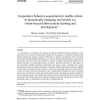Free Online Productivity Tools
i2Speak
i2Symbol
i2OCR
iTex2Img
iWeb2Print
iWeb2Shot
i2Type
iPdf2Split
iPdf2Merge
i2Bopomofo
i2Arabic
i2Style
i2Image
i2PDF
iLatex2Rtf
Sci2ools
146
click to vote
AI
1999
Springer
1999
Springer
Cooperative Behavior Acquisition for Mobile Robots in Dynamically Changing Real Worlds Via Vision-Based Reinforcement Learning a
In this paper, we first discuss the meaning of physical embodiment and the complexity of the environment in the context of multi-agent learning. We then propose a vision-based reinforcement learning method that acquires cooperative behaviors in a dynamic environment. We use the robot soccer game initiated by RoboCup (Kitano et al., 1997) to illustrate the effectiveness of our method. Each agent works with other team members to achieve a common goal against opponents. Our method estimates the relationships between a learner's behaviors and those of other agents in the environment through interactions (observations and actions) using a technique from system identification. In order to identify the model of each agent, Akaike's Information Criterion is applied to the results of Canonical Variate Analysis to clarify the relationship between the observed data in terms of actions and future observations. Next, reinforcement learning based on the estimated state vectors is performe...
| Added | 22 Dec 2010 |
| Updated | 22 Dec 2010 |
| Type | Journal |
| Year | 1999 |
| Where | AI |
| Authors | Minoru Asada, Eiji Uchibe, Koh Hosoda |
Comments (0)

